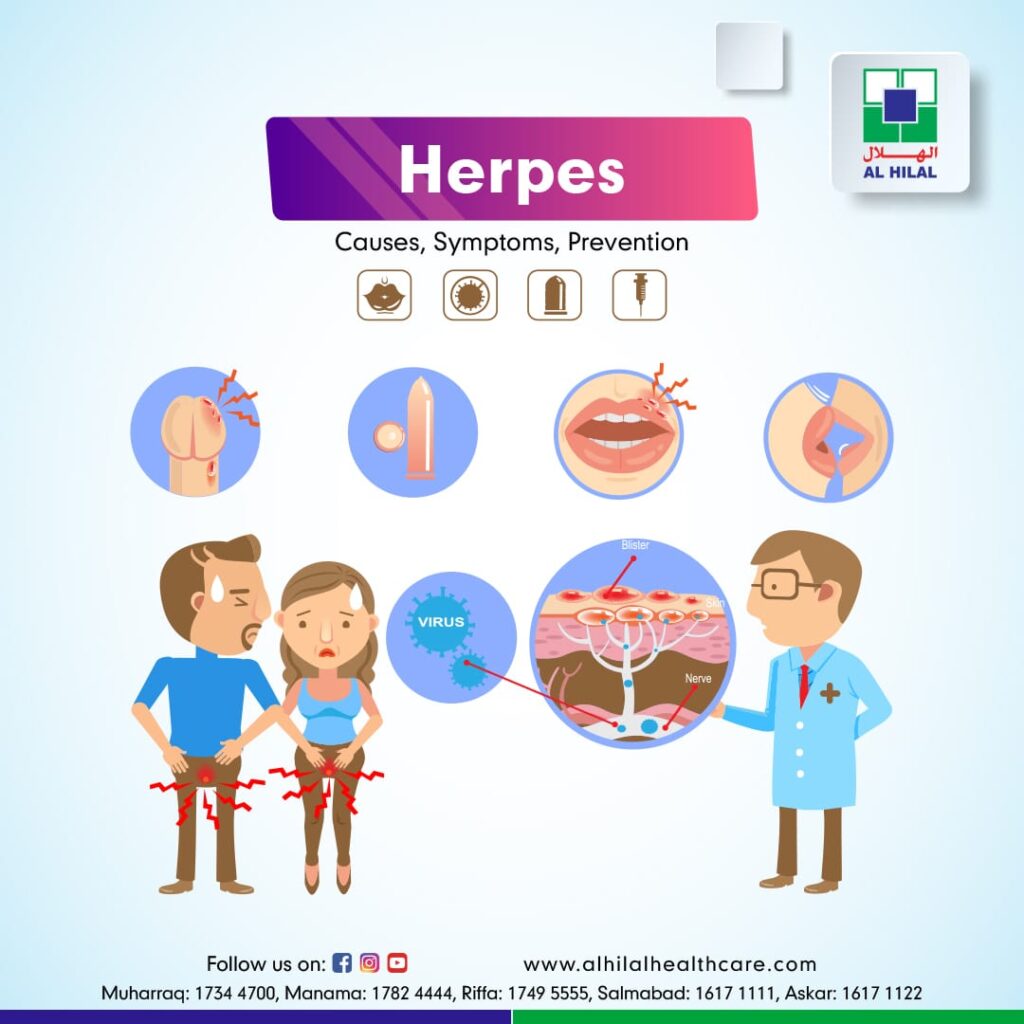Herpes results from infection with the herpes simplex virus (HSV). It causes sores or blisters in or around the mouth or genitals, alongside other symptoms. Herpes is a disease that is shared globally. HSV type 1 is usually transmitted by oral-to-oral contact and causes illness in or around the mouth, called oral herpes, but it can also cause genital herpes. HSV-2 is primarily sexually transmitted and generates genital herpes.

Both oral and genital herpes is asymptomatic or unrecognized but can cause hurting ulcers or blisters in the area of infection, varying from mild to severe. Illness is lifelong, and signs can recur over many years. Some medicines are available to reduce the frequency and severity of symptoms, but they can’t cure the condition.
Recurrent signs of both oral and genital herpes will be uncomfortable. Genital herpes can also be stigmatizing and affect sexual relationships. However, most people with herpes adjust to living with the infection.
WHO MIGHT GET HERPES?
People of any age can contract herpes. However, you have a high chance of getting the virus:
- If you have had multiple sex partners.
- If you were assigned female at birth.
- If you started having sex at a young age.
- If you have a weakened immune system.
- If you have a history of any sexually transmitted infection.
- If you don’t use condoms for intercourse and dental dams for oral sex.
SYMPTOMS OF HERPES:
Individuals who produce signs and symptoms of herpes may undergo itching, tingling, or burning, then notice blisters or sores forming around the genitals or mouth.
Signs tend to originate two to twenty days after exposure to the virus.
Symptoms of Oral Herpes:
Oral herpes causes blisters to develop in or around the mouth and lips.
Occasionally these blisters form elsewhere on the tongue or face and more infrequently on other areas of skin.
The sores generally last two to three weeks before clearing up.
Symptoms of Genital Herpes:
These sores tend to form around or inside the vagina, on the penis, the anus, or buttocks, though they can also be formed on other areas of skin.
Herpes can also cause changes in vaginal discharge and pain when urinating.
The first time a person develops the sores, they may last two to six weeks before clearing up.
Shortly after this initial outbreak, signs may often recur. However, seizures may happen over time, and the symptoms generally become less intense.
Initial Episode Symptoms:
These happen when an individual first develops the illness.
Alongside blisters or sores, herpes may cause:
- swollen lymph nodes
- pain and itching
- fatigue and a general feeling of being unwell
- a fever
Recurring Symptoms:
Symptoms and signs that reappear are identical to the initial symptoms and signs. However, they tend to be less intense and last for a shorter duration.
Research suggests that about 50% of people with genital herpes and 33% of those with oral herpes experience recurring symptoms.
CAUSES OF HERPES:
Two types of herpes infections can cause genital herpes:
- HSV-1: This type usually causes fever blisters or cold sores around your mouth. HSV-1 is generally spread through skin-to-skin contact, though it can be extended to your genital area. Recurrences are less frequent than they are with HSV-2 infection.
- HSV-2: This type commonly causes genital herpes. The virus spreads through skin-to-skin contact and sexual contact. HSV-2 is highly contagious and ubiquitous, whether you have an open sore or not.
The virus dies fast outside the body, so getting the disease through contact with an infected person’s towels, toilets, or other objects is almost impossible.
RISK FACTORS OF GENITAL HERPES:
The risk of becoming infected with genital herpes may raise:
- If you are a woman: Women have more chance of getting infected from genital herpes than men. The virus is sexually transmitted more easily from men to women than from women to men.
- If you have multiple sexual partners: Each additional sexual partner increases your risk of exposure to the virus that causes genital herpes.
COMPLICATIONS OF GENITAL HERPES:
The complications associated with genital herpes may include:
- Other Sexually Transmitted Infections: Having genital sores raises the risk of contracting or transmitting other sexually transmitted diseases, including AIDS.
- Newborn Infection: The babies delivered to infected moms can be revealed to the virus during the delivery process. This may result in the baby’s blindness, brain damage, or even death.
- Bladder Problems: Occasionally, the sores connected with genital herpes can induce inflammation around the tube that delivers urine from the bladder to the urethra. The swelling can close the urethra for a few days, demanding the insertion of a catheter to empty your bladder.
- Meningitis: Rarely, HSV infection guides to membrane inflammation and cerebrospinal fluid encircling your spinal cord and brain.
- Rectal Inflammation: Genital herpes can lead to inflammation of the rectum’s lining, particularly in men who have sex with men.
PREVENTION OF HERPES:
The recommendations for preventing genital herpes are the same as those for preventing other sexually transmitted infections: Limit sexual contact to only one infection-free person or abstain from sexual activity.
- Avoid intercourse if any of the partners has an outbreak of herpes in the genital area or anywhere else.
- Use a latex condom during sexual intercourse.
- Wash the hands thoroughly, especially after touching the affected area, during an outbreak.
TREATMENT FOR HERPES:
There are a few treatments for both genital and oral herpes.
Home Remedies:
The following are some home remedies you can try to treat herpes. But make sure you try the home remedies only after consulting with a doctor.
- Taking pain relief medication, such as ibuprofen or acetaminophen.
- Bathing in lightly salted water.
- Sprinkling water from a bottle onto blisters to reduce the pain while urinating.
- Applying aloe vera gel to the sores.
- Using petroleum jelly in the affected regions.
- Wear loose clothes to avoid irritation.
- Refraining from sexual activity, even with protection, until signs have been gone.
- Use a cream or lotion to the urethra before urinating, such as one that contains lidocaine.
Medications:
No medication can cure the herpes virus completely. However, a doctor may recommend an antiviral medicine to prevent the virus from reproducing.
Meanwhile, over-the-counter herpes treatments can help manage itching, tingling, and pain.
To lessen the duration of an outbreak significantly, begin medicine within 24 hours of initial symptoms.
If a person uses the antiviral medicine, signs may settle one or two days faster than if they had used no treatment. Medication may also decrease the seriousness of signs and symptoms.
If a person has rarer than six repetitions of genital herpes per year, a doctor may prescribe an antiviral medication for each repetition.
If an individual feels repetitions more frequently, a doctor may recommend taking an antiviral for six to twelve months.
Taking these medications for extended periods can significantly reduce the risk of passing herpes to a partner, though it remains a possibility.


